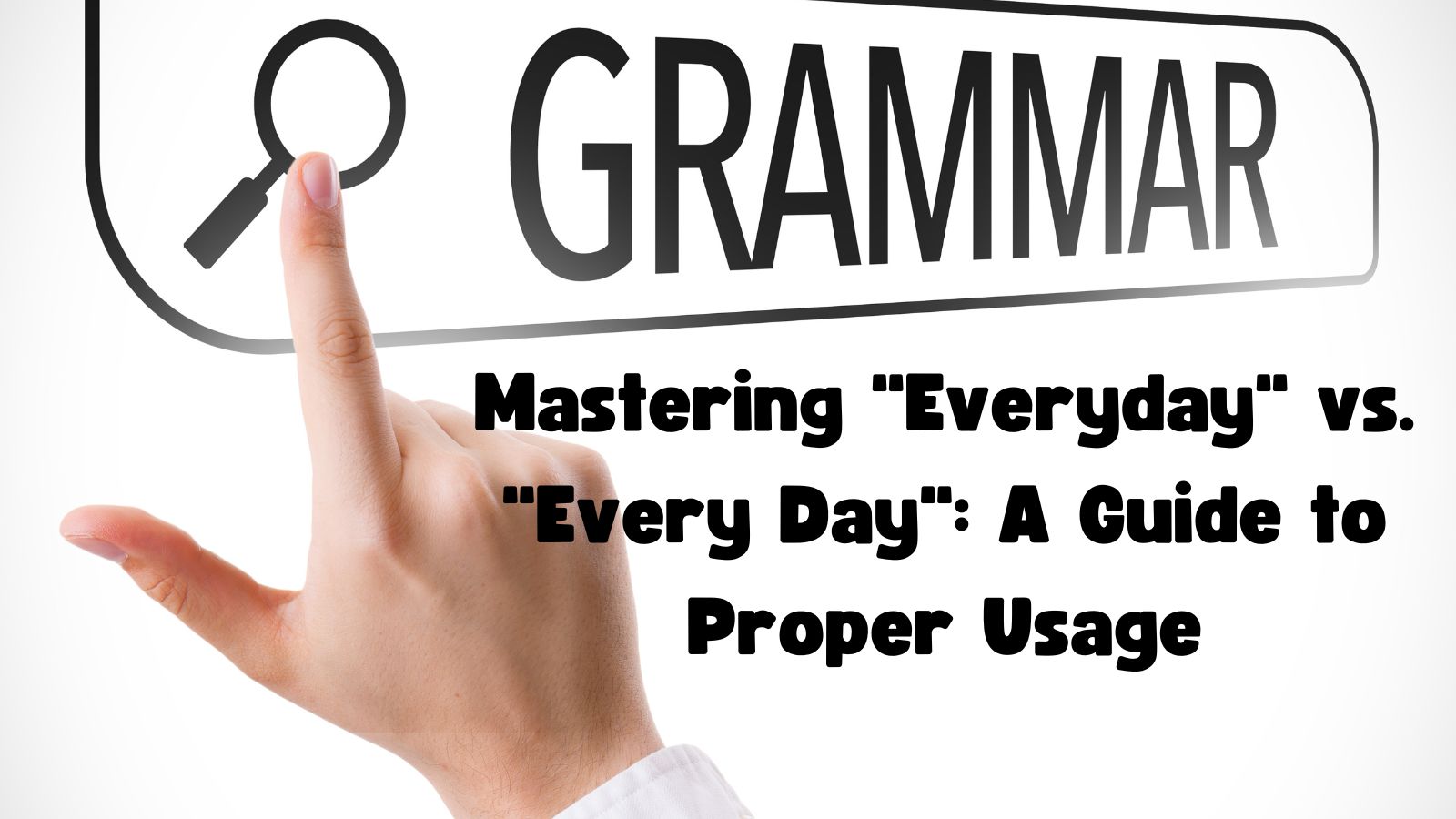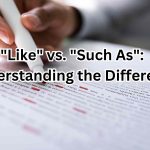
Mastering “Everyday” vs. “Every Day”: A Guide to Proper Usage
Introduction: Many English learners and native speakers alike often struggle with the correct usage of “everyday” and “every day.” While these terms may appear similar, they serve different purposes in a sentence. In this article, we will explore the differences between “everyday” and “every day,” providing examples to help you master their usage.
Everyday: “Everyday” is an adjective that describes something that occurs or is used routinely or commonly. It is written as a single word, without a space. Here are some examples:
- I prefer wearing everyday clothes when I’m relaxing at home.
- Brushing your teeth is an everyday habit that promotes good oral hygiene.
- In my everyday life, I try to find moments of joy and gratitude.
In each of these examples, “everyday” modifies the nouns “clothes,” “habit,” and “life,” indicating that these things are commonplace or ordinary.
Every Day: “Every day,” on the other hand, is a phrase that refers to something happening each day, without exception. It is written as two separate words. Take a look at these examples:
- I go for a walk every day to stay active and healthy.
- My cat wakes me up every day at 6 a.m., demanding breakfast.
- The store is open every day from 9 a.m. to 9 p.m.
In these examples, “every day” emphasizes the daily occurrence or frequency of an action or event.
Common Mistakes and Tips: One common mistake is using “everyday” when you mean to say “every day.” Remember, if you can replace the term with “each day,” then you should use “every day.” For example:
Incorrect: I practice the piano everyday after school. Correct: I practice the piano every day after school.
Another tip is to consider whether you are using the term as an adjective or an adverb phrase. If it’s an adjective describing a noun, use “everyday.” If it’s an adverb phrase describing the frequency of an action, use “every day.”
Conclusion: By understanding the differences between “everyday” and “every day,” you can ensure that your writing is clear and accurate. Remember, “everyday” is an adjective that describes something commonplace, while “every day” is a phrase that emphasizes daily occurrence. With practice and attention to detail, you’ll be using these terms correctly in no time!
Entomology of Everyday vs Every Day
The terms “everyday” and “every day” have different etymologies, as they are formed from distinct words and have evolved separately over time.
Etymology of “everyday”: The adjective “everyday” is derived from the combination of the words “every” and “day.” The word “every” comes from the Old English word “ǣfre,” which meant “always, at all times.” This word evolved from the Proto-Germanic “*aiwaz,” meaning “age, eternity.”
The word “day” also has Old English roots, stemming from the word “dæg,” which itself descended from the Proto-Germanic “*dagaz,” meaning “day.”
Over time, the phrase “every day” began to be used as a single word, “everyday,” to describe things that occur daily or are commonplace.
Etymology of “every day”: The phrase “every day” is a combination of the words “every” and “day,” each with its own etymology.
As mentioned earlier, “every” comes from the Old English word “ǣfre,” which evolved from the Proto-Germanic “*aiwaz,” meaning “age, eternity.”
Similarly, “day” originated from the Old English word “dæg,” which descended from the Proto-Germanic “*dagaz,” meaning “day.”
When used together, “every day” functions as an adverbial phrase, indicating that an action or event occurs on a daily basis.
In summary, while both “everyday” and “every day” share the same ancestral words, they have developed different meanings and grammatical functions over time. “Everyday” has transformed into a single word that functions as an adjective, while “every day” remains a two-word phrase that serves as an adverbial phrase.
Lesson Plan: Mastering “Everyday” vs. “Every Day”
Objective: Students will learn the difference between “everyday” and “every day,” and be able to use them correctly in sentences by the end of the lesson.
Materials:
- Whiteboard and markers
- Handouts with examples and practice exercises
- Interactive online quiz (optional)
Duration: 45-60 minutes
Introduction (5-10 minutes):
- Begin by writing “everyday” and “every day” on the whiteboard.
- Ask students if they know the difference between the two terms and discuss their responses.
- Explain that while these terms may appear similar, they serve different purposes in a sentence.
Instruction (15-20 minutes):
- Define “everyday” as an adjective that describes something that occurs or is used routinely or commonly. Provide examples:
- I prefer wearing everyday clothes when I’m relaxing at home.
- Brushing your teeth is an everyday habit that promotes good oral hygiene.
- Define “every day” as a phrase that refers to something happening each day, without exception. Provide examples:
- I go for a walk every day to stay active and healthy.
- The store is open every day from 9 a.m. to 9 p.m.
- Highlight the main difference: “everyday” is an adjective, while “every day” is an adverbial phrase.
- Explain the common mistake of using “everyday” when meaning to say “every day,” and provide the tip: if you can replace the term with “each day,” then you should use “every day.”
Guided Practice (10-15 minutes):
- Distribute handouts with examples and practice exercises.
- Have students work in pairs or small groups to complete the exercises, identifying the correct usage of “everyday” and “every day” in various sentences.
- Review the answers as a class, discussing any questions or concerns that arise.
Independent Practice (10-15 minutes):
- Provide students with additional sentences to complete individually, using either “everyday” or “every day.”
- Optionally, direct students to complete an interactive online quiz for further practice.
Closure (5 minutes):
- Review the key points of the lesson: “everyday” is an adjective describing something commonplace, while “every day” is a phrase emphasizing daily occurrence.
- Encourage students to continue practicing and applying what they’ve learned in their writing and speaking.
Assessment:
- Observe student participation and understanding during guided practice.
- Review students’ independent practice exercises and provide feedback.
- Optionally, use the results of the interactive online quiz to gauge student understanding.
Extension:
- Have students write a short paragraph about their everyday routines, correctly using both “everyday” and “every day.”
- Discuss other commonly confused words or phrases in the English language and compare them to “everyday” and “every day.”
10 practice questions to help you master the usage of “everyday” and “every day”:
- I make sure to exercise _____ to maintain my fitness. a) everyday b) every day
- The _____ hustle and bustle of city life can be overwhelming at times. a) everyday b) every day
- Mark visits his grandmother _____ to check on her well-being. a) everyday b) every day
- The _____ challenges we face help us grow and learn. a) everyday b) every day
- I take my vitamins _____ to support my overall health. a) everyday b) every day
- The _____ commute to work can be stressful, especially during rush hour. a) everyday b) every day
- Sarah practices her violin _____ to improve her skills. a) everyday b) every day
- The _____ tasks of cooking and cleaning can sometimes feel monotonous. a) everyday b) every day
- I call my best friend _____ to catch up and share stories. a) everyday b) every day
- The _____ use of smartphones has changed the way we communicate. a) everyday b) every day
- 100 Screenwriting Ideas to Get You Writing - January 20, 2026
- 100 Winter Storm Writing Prompts - January 17, 2026
- 100 Haunted House Story Starters: Craft Your Scariest Tale Yet - January 10, 2026



